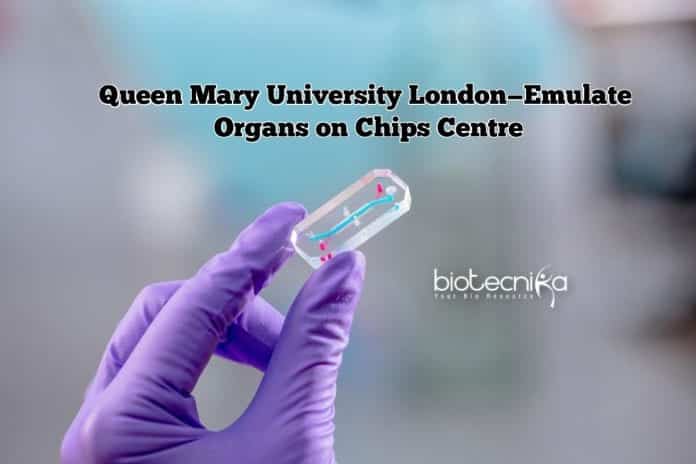Organs On Chips Center UK – Queen Mary University London
The Queen Mary University of London has opened a new research center named ‘Queen Mary—Emulate Organs on Chips Centre’ to revolutionize drug development and medical research through micro-engineered organs-on-chips.
Organs on chips recreate microenvironment experienced by cells within the human body. They contain tiny hollow channels lined by living human cells that act as miniaturized living systems that could predict human response with greater detail and precision compared to the current animal-based and cell culture testing. They can also be used in laboratories to test therapeutics and examine how the body reacts to the drug.
The organs on chips at the UK center will be used to recreate the environment of different organs inside the human body by incorporating the appropriate types of tissues and cells grown under continuous fluid flow and mechanical forces like peristalsis and cyclic breathing.
They have the potential to improve the accuracy of therapies and drug testing to predict the efficacy and safety of therapies in the human body. These organs on chips will also help to reduce the use of animals and improve the understanding of disease mechanisms.
Emulate, a U.S based company that
is at the forefront of marketing lab-ready systems and Organs on chips worldwide, has collaborated with Queen Mary for the establishment of the center.The researchers can develop organ models of their design to be used in different drug development programs and experiments. Opportunities for collaboration with Emulate as well as support for translation impact and commercialization will be provided by the center.
The organs on chips technology will let the scientists for the first time to recreate the behavior of organs, tissues, and cells as found in the human body to test new therapies and understand more about disease mechanisms, said Professor Martin Knight, Director of the new Queen Mary—Emulate Organs-on-Chips Centre. The technology is leading the world to personalized medicine by making it possible to check how an individual’s body responds to a particular treatment like a specific drug combination.
The center has an extensive suite of Emulate’s Organs-on-Chips testing platforms with a dedicated staff. It is situated inside the School of Engineering and Materials Science in Queen Mary.
The organs on chips can also be used to observe the body’s response to different compounds like pollutants, food ingredients, and pesticides.
The dynamic cellular microenvironment of the body that includes mechanical forces, immune cell interactions, tissue to tissue interaction, and blood flow can be recreated by these chips.
Many pharmaceutical companies are investing in organs on chips for drug discovery and development.
Professors Knight and Screen, directors of Queen the Centre also runs the UK’s Organs-on-a-chip Technologies Network. The network tries to tackle the major technical questions associated with developing and building new Organs-on-Chips by bringing together the industrial partners, stakeholders, and research community of the UK.
To drive the innovation forward and for the rapid adoption of this new technology, the members of the network will make use of the new Queen Mary—Emulate Organs-on-Chips Centre
The organs on chips market will soon become a multi-billion dollar market, with its 38-57 percent growth over the next five years.






























